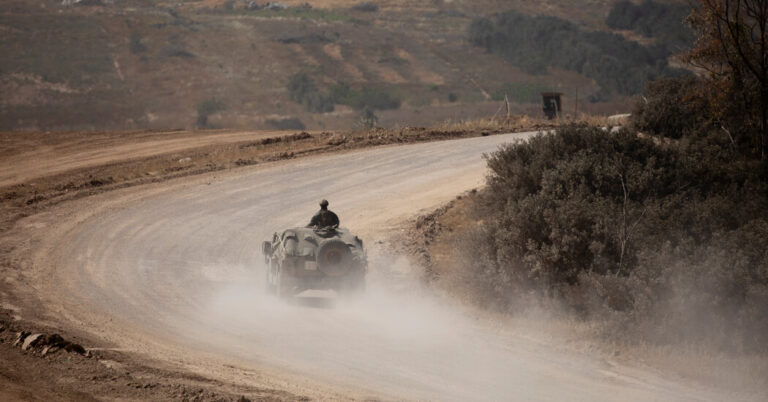Within moments of Israel and its allies shooting down a fusillade of Iranian missiles and drones this weekend, many began to wonder what the latest exchange between Israel and Iran would mean for the war in the Gaza Strip.
The Iranian attack was in retaliation for what is believed to be a massive Israeli strike this month on an embassy building in Damascus that killed seven Iranian officials, including three top commanders in Iran’s armed forces. But this happened against the backdrop of the war in Gaza, where Israel is fighting Hamas, a militant group funded and armed by Iran.
Israeli military analysts are divided on whether a more direct confrontation with Iran would change the war in Gaza, now in its sixth month. The next fulcrum in that war may hinge on whether Israel decides to pursue Hamas in the southern city of Rafah, where more than a million Palestinians have fled amid a swirling humanitarian crisis.
Some analysts have argued that the implications for Gaza will depend on whether Israel responds with a major counterattack against Iran. Others contended that Israel’s military campaign in the Gaza Strip would not be affected.
Shlomo Brom, a retired brigadier general and a former director of the Israeli military’s strategic planning division, said that if Israel responded with large force to the Iranian attack, it could provoke a multifront war that would force to the Israeli leadership to turn its attention away from Gaza.
In the case of a significant regional conflagration, General Brom said, Israel could choose to postpone its plans to attack Rafah, which Israeli officials describe as Hamas’ last stronghold.
“It’s not comfortable for us to have a simultaneous, high-intensity war in multiple theaters,” General Brom added.
Prime Minister Benjamin Netanyahu has pledged to send ground forces to Rafah, despite international pressure to halt the operation. On Sunday, an Israeli official, who spoke on condition of anonymity to discuss internal deliberations, said the Iranian attack had no effect on the military’s plans to attack Rafah.
A large-scale direct confrontation with Iran could potentially end the war in Gaza, General Brom said. But for the war to end that way, it would require a broader ceasefire covering several parties, including Israel, Iran and the Iran-backed militant groups Hamas and Hezbollah.
“There is an idea that in order to resolve a crisis, the situation must first deteriorate,” he said, explaining that an escalation followed by a comprehensive ceasefire in Iran could prompt that country to push regional its proxy to stop fighting Israel.
While members of Israel’s war cabinet did not issue a formal statement after Sunday’s meeting, a separate Israeli official, who spoke on condition of anonymity to discuss the talks, indicated that the country will respond to an Iranian attack — even if there is a large one. uncertainty of when and how.
Other military experts, however, denied the link between Iran’s attack and the war in Gaza.
“There is no connection at all,” said Amos Gilead, a retired major general who served in Israeli military intelligence.
General Gilead said that the Israeli Army has enough resources to fight against Iran and continue the war against Hamas in Gaza.
Other analysts make a similar point, arguing that the resources needed to fight Iran are different from those needed in Gaza. Israel needs fighter jets and air defense systems to counter Iran, they say. In contrast, they added, the army mainly needs ground troops, drones and attack helicopters to fight Hamas in Gaza.
“There is no real tension between these two things,” said Giora Eiland, a retired major general and former head of Israel’s National Security Council.
However, General Eiland said that the success of the coalition that repelled the Iranian attack, which includes the United States, Britain and Jordan, could inspire Israel to take advantage of the momentum to overcome its declining status throughout world by ending the war in Gaza.
Although the United States, Israel’s closest ally, has broadly supported Israel’s decision to go to war in Gaza, it has increasingly signaled its displeasure at the mounting death toll and warned against a major escalation. ground attack in Rafah. The support the United States gave Israel on Sunday in shooting down Iranian drones and missiles could give its Israeli counterparts more leverage.
Although General Eiland said that such an outcome could help Israel gain goodwill in the international community and contribute to reaching a solution to end the war in Gaza and fighting with Hezbollah, the militia backed by Iran in Lebanon, he doubts Mr. Netanyahu will. wallet like a path.
“He says he wants to achieve ‘total victory’ in Gaza and capture Rafah, a process that could take two or three months,” he said, referring to the prime minister. “It’s clear that Netanyahu has a different mind-set and priorities.”
Aaron Boxerman contributed reporting.
